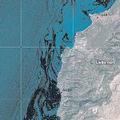 以色列7月13至15日空襲黎巴嫩,摧毀黎國南部基業(Jiyyeh)電廠儲油槽,造成至少10,000至35,000公噸原油流入地中海,污染了黎巴嫩沿岸逾140公里,並往北延伸到敘利亞水域,有人擔心將擴散到土耳其與塞浦路斯沿海。敘利亞與黎巴嫩已向聯合國請求援助,協助清理沿岸浮油,聯合國已於8日派遣兩名專家抵達敘利亞,評估沿海漏油的生態衝擊,無奈戰火方酣,連接近事故現場都不太可能。
以色列7月13至15日空襲黎巴嫩,摧毀黎國南部基業(Jiyyeh)電廠儲油槽,造成至少10,000至35,000公噸原油流入地中海,污染了黎巴嫩沿岸逾140公里,並往北延伸到敘利亞水域,有人擔心將擴散到土耳其與塞浦路斯沿海。敘利亞與黎巴嫩已向聯合國請求援助,協助清理沿岸浮油,聯合國已於8日派遣兩名專家抵達敘利亞,評估沿海漏油的生態衝擊,無奈戰火方酣,連接近事故現場都不太可能。
聯合國環境規劃署(UNEP)8日指出,此次黎巴嫩電廠流入地中海的原油量,已直追1999年艾利卡號(Erika)油輪在法國沿海的漏油事件,當時漏出13,000公噸原油到大西洋中。聯合國環境規劃署警告,如果基業電廠所有儲油均流入地中海的話,其災難程度將不亞於1989年艾克森瓦爾迪茲號(Exxon Valdez)的漏油事故。
漏油事故影響所及,一些重要的商業魚種如黑鮪魚等,以及其他海洋生物,必將受到衝擊。義大利籍海洋生物專家阿馬托(Dr. Ezio Amato)指出:「浮油對生物多樣性絕對是一大威脅。」阿馬托是聯合國派抵大馬士革評估漏油衝擊的專家之一,其專長是評估人類活動、污染事件對海底生態的衝擊。阿馬托表示:「鮪魚的魚卵和幼體均浮在水面上,因此是漏油事件的直接受害者,這可能對地中海鮪魚數量有嚴重的後續衝擊。」環保人士阿德里斯(Iffat Edriss)形容海洋生態性的慘況時表示:「我在拉姆雷阿班達海灘看到許多死魚、死蟹。」拉姆雷阿班達(Ramlet al-Baida)海灘是貝魯特唯一的公共海灘。
儘管現階段的整治工作困難重重,資訊不足,清理行動無法受制戰火無法展開,但阿馬托仍將透過衛星影像與電腦模型所提供的現場評估資訊,提供驗證過的視覺影像資料。
Two United Nations experts arrived today in Syria to evaluate the consequences of the oil spill that has contaminated more than 140 kilometers of the Lebanese coastline and has spread north into Syrian waters. Syria and Lebanon have both requested UN help to clean the spill from a bombed power plant south of Beirut. But heavy fighting continues to rage in Lebanon, making access impossible.
The Israeli bombing of the Lebanese power plant at Jiyyeh 30 kilometers south of Beirut on July 13 and 15 is believed to have spilled at least 10,000 and up to 35,000 metric tons of oil into the Eastern Mediterranean. Some fear the oil could spread to Turkey and Cyprus.
UNEP said today that the quantity of oil spilled in Lebanon is already comparable to the disaster caused in 1999 off the coast of France when the Erika tanker spilled 13,000 metric tonnes of oil into the Atlantic Ocean. The agency warned that if all the oil contained in the bombed power plant at Jiyyeh leaked into the Mediterranean Sea, the Lebanese oil spill could rival the Exxon Valdez disaster of 1989
Marine species such as the commercially important bluefin tuna are believed to have been affected by the oil spill. "This oil slick definitely poses a threat to biodiversity," said marine biologist Dr. Ezio Amato of Italy, who arrived in Damascus today to assess the spill. Dr. Amato is a specialist in the impact of human activities on marine benthic ecosystems, fate and effects of pollutants in these ecosystems.
"Because tuna's eggs and larvae float on the water surface, they can be directly affected by this oil slick, with potential serious consequences for the tuna population in the Mediterranean," Amato said.
"I saw many fish and crabs dead by the Ramlet al-Baida beach," environmental activist Iffat Edriss describing the situation as a disaster for the marine ecosystem. Ramlet al-Baida is the only public beach in Beirut.
At this stage the information however remains sketchy and no cleanup action has been possible. Dr. Amato will provide visual documentation and validate through a field assessment what is shown in the satellite imagery and models.





